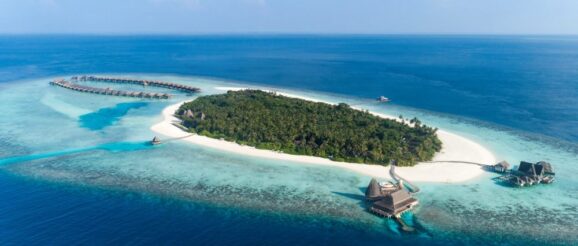Anantara Kihavah Maldives blends tradition with innovation to serve up sustainable tourism

Nestled in the pristine beauty of the Baa Atoll archipelago, Anantara Kihavah Maldives Villas stands as a testament to the resort’s unwavering commitment to environmental preservation. From the very beginning of its construction, the resort embraced a unique approach: not a single tree was cut, and the villas were meticulously designed and built around them. Today, Anantara Kihavah continues to reinforce its dedication to environmental, social, and cultural conservation, striving to create an environmentally sustainable tourist destination while drawing inspiration from the island’s rich heritage and traditions.
The island’s history traces back to Arab traders and local fishermen seeking refuge. The resourcefulness of early fishermen is showcased through the traditional method of drawing fresh water from the ground, exemplified by the well discovered during the resort’s construction. Today, water management plays a crucial role in maintaining environmental sustainability. Through desalination and reverse osmosis, sea water is converted into potable water, while a sewage treatment plant processes wastewater into usable effluent for irrigation. Guests are encouraged to participate in water conservation by reusing their towels, thereby reducing unnecessary water consumption.
The resort’s commitment to the surrounding waters and marine life is reflected in its location within a UNESCO-protected biosphere reserve. Anantara Kihavah implements various measures and programmes to fulfil its environmental obligations. Guests can join reef cleaning efforts and participate in the Coral Adoption Programme, where they can plant coral in the resort’s reef nursery and follow its growth through photo updates. The resort also promotes the use of “reef-safe” sunscreen and provides educational signage on responsible behaviour in the water.
Anantara Kihavah also engages children in sustainable and responsible tourism through its Kids Marine Biology Programmes. These programmes introduce children from eight upwards to diving and snorkelling, teaching them about the reef ecosystem and biodiversity. In addition to Kids Marine Biology Programmes, the resort’s marine biologist conducts weekly presentations for kids and adults and takes young visitors to the underwater SEA restaurant to observe fish in their natural habitat.
The “Dollars for Deeds” initiative allows guests to contribute to the resort’s reef and CSR programmes. Guests can donate one dollar for each night of their stay or contribute through the purchase of Bon Aqua water, with the resort matching the donations. These funds support marine and coastal environment protection, environmental education, and community welfare.
On land, guests can engage in island cleaning activities and educational nature tours. The resort’s organic garden and orchid garden tours showcase sustainable practices, with the latter offering an opportunity to indulge in afternoon tea amidst the exquisite beauty of blooming orchids. Waste management is addressed through recycling programmes, with organic waste turned into compost and non-biodegradable waste carefully segregated and reused or provided to the local community.
Anantara Kihavah has also embraced a zero-plastic initiative, replacing single-use plastics with biodegradable alternatives. Refillable dispenser bottles are used for toiletries, and glass bottles are provided for water consumption. The resort generates its own distilled water and employs energy-efficient practices, such as invertor-type air-conditioning units, EcoGen boilers utilising waste heat, and motion sensor lighting. A solar energy system further reduces the reliance on diesel consumption.
It’s clear from the number of initiatives implemented that Anantara Kihavah Maldives takes its environmental obligations seriously. The resort has gone to great lengths in blending traditional wisdom with innovative ideas to create a resort that is fully committed to preserving its natural beauty and delivering sustainable tourism.
